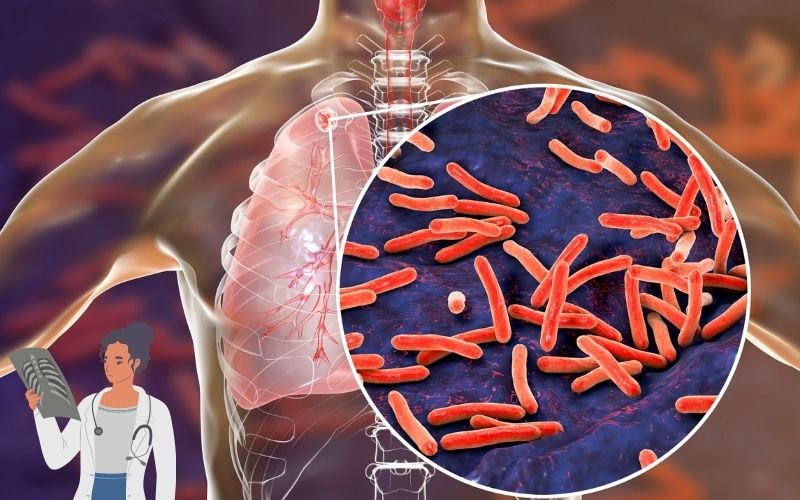Tuberculosis, commonly known as TB, remains one of the most widespread infectious diseases globally. In India, TB affects thousands each year and continues to be a major public health concern. The disease primarily attacks the lungs, though it can spread to other organs in severe cases. Tuberculosis is caused by a bacterium called Mycobacterium tuberculosis. It spreads through tiny droplets released in the air when an infected person coughs or sneezes
Being in a metropolis such as Delhi a high concentration city, exposes them more to the risk of having the disease developed. Thus it is vital to prevent complications using effective diagnosis and treatment. Delhi is a place with leading pulmonology hospitals that can provide efficient treatment of tuberculosis, followed by care and monitoring of the patient. This article addresses what TB is its symptoms, treatment and where you can find the best care in Delhi.
What Is Tuberculosis and How Does It Spread?
Tuberculosis is an infectious disease that mainly affects the lungs but can involve the brain, bones, and spine. The tuberculosis disease spreads through airborne transmission, often when people are in close contact with someone who has active TB.
The bacteria multiply slowly, and symptoms may not show for weeks or even months. TB becomes contagious when it is in the lungs and the person is coughing.
Main Causes of Tuberculosis
The answer to what tuberculosis is caused by lies in a slow-growing bacterium. The bacterium thrives in areas with poor ventilation and inadequate health care. It can remain dormant in the body for years, which is known as latent TB. People with weakened immune systems, such as those with HIV or diabetes, are more likely to develop active TB.
Tuberculosis Symptoms
Some of the common signs include:
- Persistent cough lasting more than 3 weeks
- Blood in sputum
- Chest pain
- Fatigue and weakness
- Night sweats
- Unexplained weight loss
- Fever and chills
In severe cases, TB may damage lung tissue. TB of the spine or kidney may cause more specific symptoms. Tuberculosis of lungs remains the most common and contagious type.
Types of Tuberculosis
TB is not just one condition. There are different tuberculosis types, which include:
- Pulmonary TB – affects lungs, most common
- Extrapulmonary TB – affects kidneys, spine, lymph nodes
- Miliary TB – spreads throughout the body
- Drug-resistant TB – harder to treat, requires second-line drugs
Why Tuberculosis Happens: Key Causes and Risks
Tuberculosis causes are rooted in bacterial infection, but several risk factors increase the likelihood of catching it:
- Close contact with infected individuals
- Poor ventilation in living or working areas
- Weak immune system
- Malnutrition
- Substance abuse or smoking
- Delayed treatment or incomplete medication
The tuberculosis reason often links to social and environmental conditions. TB is more common in urban slums or places with poor access to medical care.
Tuberculosis Medicines in Delhi
The first step in treating TB involves a strict medicine routine. Tuberculosis drugs usually include a combination of four key antibiotics:
- Isoniazid (INH)
- Rifampicin (RIF)
- Ethambutol (EMB)
- Pyrazinamide (PZA)
These medicines are given for 6–9 months. It’s critical that patients take the full course. Skipping doses can lead to drug resistance, making tuberculosis treatment harder.
For drug-resistant TB, second-line tuberculosis medication like Kanamycin, Capreomycin, or Linezolid may be needed. Any of the medicines should only be consumed after diagnosis and consultation from a good pulmonologist doctor in Delhi
TB Testing and Imaging in Delhi
Diagnosis involves several steps:
- Tuberculin Skin Test (TST) or Mantoux test
- Sputum Test for acid-fast bacilli
- GeneXpert for rapid detection
- Chest X-rays to detect lung damage
- CT scans for detailed imaging
Pulmonology hospitals in Delhi use high-end machines to detect the disease early and monitor progress. Imaging can also help identify tuberculosis sclerosis, a rare condition involving hardening or scarring due to TB.
Lung TB Cases in Delhi: Why Specialized Care Matters
With high pollution levels and population density, Delhi reports more TB cases than many other cities. Tuberculosis of lungs accounts for a major share of these cases. Patients in Delhi often need repeated check-ups and imaging scans, especially when symptoms return.
Choosing a specialized lung hospital in Delhi ensures access to infectious disease specialists, pulmonologists, and support staff.
Is Tuberculosis Curable? Yes, But It Needs Time
One of the most asked questions is: Is TB curable? The answer is yes, most TB cases can be cured with early detection and complete treatment. Stopping treatment early or self-medicating can lead to multi-drug resistant TB (MDR-TB). MDR-TB takes longer to cure and needs stronger drugs.
Tuberculosis Treatment in Delhi Duration and Follow-up
Standard TB therapy lasts about 6 months, but it can extend to 9–24 months in resistant cases. DOTS (Directly Observed Treatment, Short-course) is the most reliable strategy. In this system, a healthcare worker watches the patient take the medication.
Follow-ups often include repeat sputum tests, chest X-rays, and blood tests to monitor liver and kidney functions affected by the drugs.
Tuberculosis in Children and Seniors
Children and older adults are more likely to have TB-related complications. Pediatric TB symptoms are often vague, and seniors may develop TB from latent infection reactivating.
Treatment in such cases must be personalized, with lower doses or additional care to avoid drug toxicity.
Why Pulmonology Hospitals in Delhi Lead in TB Care
Delhi hosts several renowned pulmonology hospitals equipped with TB care units. They offer:
- Real-time diagnostics
- In-patient care
- Specialized isolation wards
- On-site pharmacies
- Counseling and diet advice
These centers ensure that TB patients are monitored closely from start to finish.
Precautions for TB Patients and Families
To stop the spread of TB at home:
- Keep windows open for fresh air
- Cough into tissues or elbows
- Wash hands regularly
- Avoid sharing utensils or personal items
- Wear a mask around others
- Finish all medication without missing doses
Families should also go for screening if one member is diagnosed with TB.
Innovations in TB Treatment: Future Outlook
New developments in tuberculosis treatment include:
- Shorter drug regimens for latent TB
- Bedaquiline-based therapies for MDR-TB
- TB vaccines under testing
- AI-assisted radiology for faster diagnosis
Hospitals in Delhi are already adapting to these changes. Leading centers offer experimental therapies under controlled conditions.
Nutritional Guidelines for Tuberculosis Recovery
Nutrition plays a central role in healing from tuberculosis. When the body fights TB, it uses more energy and nutrients. This makes proper nutrition essential to strengthen the immune system and reduce drug side effects.
Patients should eat a balanced diet rich in proteins, vitamins, and minerals. Protein helps rebuild damaged tissue. Vitamin A, C, and E help boost immunity. Iron and zinc support blood and cell repair. Dairy products, eggs, legumes, and lean meat are good protein sources. Citrus fruits, nuts, leafy vegetables, and whole grains can provide important vitamins.
Hydration is just as important. Water helps flush out toxins and reduces the risk of constipation from medications. Some TB drugs may reduce appetite. In such cases, smaller frequent meals are helpful. Avoid alcohol, as it may worsen liver stress caused by TB drugs.
In hospitals like Primus, nutritionists prepare patient-specific meal plans. This ensures that the patient not only fights the infection but also regains strength and weight lost during illness.
Psychological Support and Counseling for TB Patients
Tuberculosis can affect mental health just as much as physical health. The long treatment, isolation, stigma, and side effects often lead to anxiety, depression, or social withdrawal.
Psychological support becomes crucial, especially for patients with drug-resistant TB or those living alone. Support groups and individual counseling help patients stay motivated. Trained counselors educate patients about the disease, offer emotional support, and help them deal with fear and stress.
Some best hospitals in Delhi, including Primus, provide in-house psychologists and therapy programs. These services ensure that the patient’s mental health is monitored and supported during the recovery process.
Tuberculosis is a serious yet curable disease when treated properly. Early detection, strict medication routines, and quality care make all the difference. If you or your loved one show signs of TB, it’s important to seek immediate medical help.
Primus Super Specialty Hospital in Delhi is known for its advanced TB treatment and pulmonology care. With expert doctors, modern labs, and a supportive environment, Primus is among the most trusted names in Delhi for tuberculosis treatment. From diagnostics to recovery, the hospital ensures every patient receives complete, compassionate care.
Don’t wait—early treatment saves lives. Reach out to Primus Hospital for advanced TB care today.













